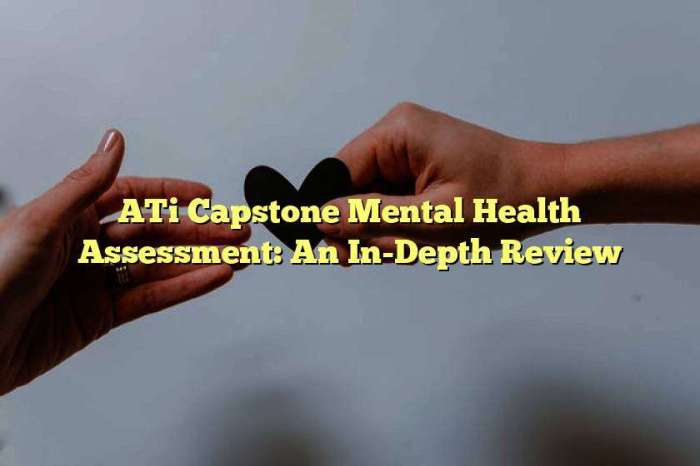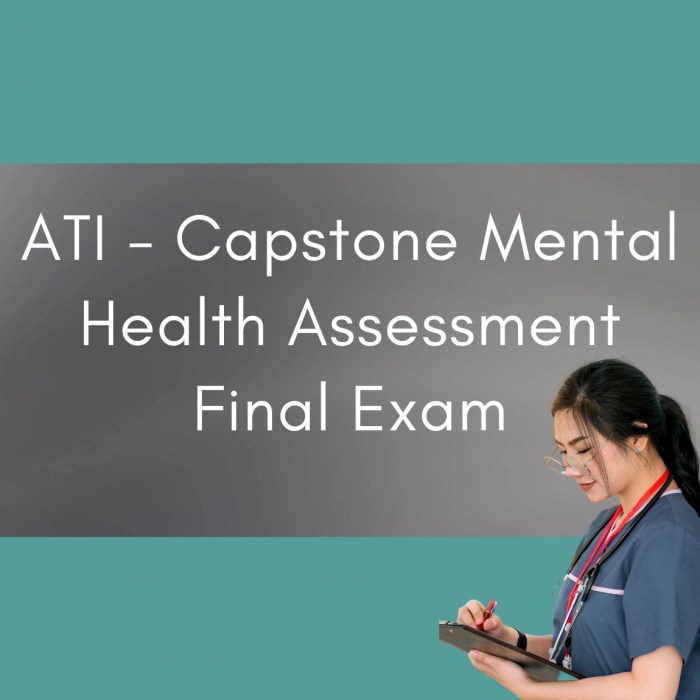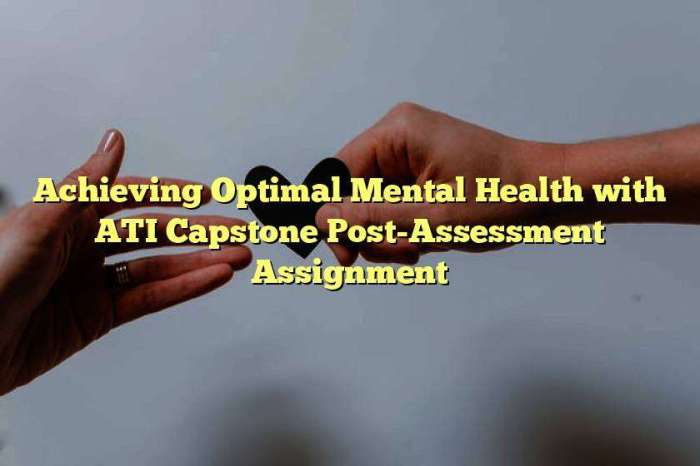The ATI Mental Health Capstone Assessment is a comprehensive tool designed to evaluate the knowledge and skills of mental health professionals. It is widely used in clinical practice to inform treatment planning, track progress, and improve the quality of care.
This guide provides an overview of the ATI Mental Health Capstone Assessment, including its components, scoring and interpretation, use in practice, and strengths and limitations.
Introduction

The ATI Mental Health Capstone Assessment is a comprehensive evaluation designed to assess the knowledge, skills, and abilities of nursing students in the field of mental health.
This assessment is a significant component of the nursing curriculum, as it provides students with the opportunity to demonstrate their proficiency in providing safe and effective care to individuals with mental health disorders.
Purpose and Significance
- Evaluate students’ understanding of mental health concepts, principles, and theories.
- Assess students’ ability to apply evidence-based practices in the care of individuals with mental health disorders.
- Identify areas where students need additional support or remediation.
- Prepare students for the NCLEX-RN examination, which includes a significant focus on mental health content.
Components of the Assessment: Ati Mental Health Capstone Assessment

The ATI Mental Health Capstone Assessment consists of several sections, each designed to evaluate different aspects of a nurse’s knowledge and skills in mental health nursing.
The assessment includes the following sections:
- Client Needs
- Nursing Interventions
- Health Promotion and Maintenance
- Professional Issues
Each section contains a variety of question types, including:
- Multiple choice questions: These questions present a stem with several possible answers, and the test taker must select the best answer.
- True/False questions: These questions present a statement, and the test taker must indicate whether the statement is true or false.
- Fill-in-the-blank questions: These questions present a statement with one or more blanks, and the test taker must fill in the blanks with the correct answer.
- Short answer questions: These questions present a question, and the test taker must provide a brief written answer.
- Case study questions: These questions present a case study, and the test taker must answer questions about the case study.
The ATI Mental Health Capstone Assessment is a comprehensive assessment that covers a wide range of topics in mental health nursing. By completing this assessment, nurses can demonstrate their knowledge and skills in this important area of nursing practice.
Scoring and Interpretation
The ATI Mental Health Capstone Assessment is scored using a standardized scoring system that assigns points to each question based on the correctness of the response. The total score is then used to determine the level of performance on the assessment.
There are three levels of performance on the ATI Mental Health Capstone Assessment: proficient, borderline, and unsatisfactory. Proficient performance indicates that the student has a strong understanding of the content covered on the assessment and is able to apply that knowledge to clinical practice.
Borderline performance indicates that the student has some understanding of the content covered on the assessment but may need additional support to apply that knowledge to clinical practice. Unsatisfactory performance indicates that the student has a limited understanding of the content covered on the assessment and may need significant additional support to apply that knowledge to clinical practice.
The results of the ATI Mental Health Capstone Assessment can be interpreted in a variety of ways. The results can be used to identify areas of strength and weakness in the student’s knowledge and skills. The results can also be used to develop an individualized learning plan for the student.
Additionally, the results can be used to make decisions about the student’s progress in the nursing program.
Scoring, Ati mental health capstone assessment
- Each question on the ATI Mental Health Capstone Assessment is worth one point.
- The total score is the sum of the points earned on all questions.
- The total score is then used to determine the level of performance on the assessment.
Levels of Performance
- Proficient:A score of 70% or higher indicates proficient performance.
- Borderline:A score between 60% and 69% indicates borderline performance.
- Unsatisfactory:A score below 60% indicates unsatisfactory performance.
Interpretation of Results
- The results of the ATI Mental Health Capstone Assessment can be interpreted in a variety of ways.
- The results can be used to identify areas of strength and weakness in the student’s knowledge and skills.
- The results can also be used to develop an individualized learning plan for the student.
- Additionally, the results can be used to make decisions about the student’s progress in the nursing program.
Use in Practice

The assessment plays a vital role in clinical practice, aiding clinicians in developing tailored treatment plans, tracking patient progress, and evaluating the effectiveness of interventions.
By providing a comprehensive profile of the patient’s mental health status, the assessment helps clinicians identify areas of concern, establish baseline measures, and monitor changes over time.
Treatment Planning
- Guides the selection of appropriate interventions based on the patient’s specific needs and strengths.
- Helps establish realistic treatment goals and objectives.
- Facilitates collaboration between the clinician and patient in developing a shared understanding of the treatment plan.
Progress Tracking
- Enables clinicians to monitor the patient’s response to treatment.
- Provides objective data to assess the effectiveness of interventions and make necessary adjustments.
- Helps identify areas where additional support or modifications to the treatment plan may be needed.
Strengths and Limitations
The ATI Mental Health Capstone Assessment is a valuable tool for assessing the mental health knowledge and skills of nurses. It has several strengths, including:
- Validity:The assessment is based on a sound theoretical framework and has been shown to be a valid measure of mental health knowledge and skills.
- Reliability:The assessment is reliable, meaning that it produces consistent results when administered to the same individuals on multiple occasions.
- Comprehensiveness:The assessment covers a wide range of mental health topics, including assessment, diagnosis, treatment, and prevention.
- Practicality:The assessment is easy to administer and score, making it a feasible tool for use in clinical practice.
Despite its strengths, the ATI Mental Health Capstone Assessment also has some limitations, including:
- Time-consuming:The assessment is time-consuming to administer and score, which may limit its use in busy clinical settings.
- Not standardized:The assessment is not standardized, which means that scores may vary depending on the individual administering the assessment.
- Not culturally sensitive:The assessment may not be culturally sensitive, which may limit its use with diverse populations.
Use in Practice
The ATI Mental Health Capstone Assessment can be used to improve the quality of care in several ways, including:
- Identifying areas for improvement:The assessment can help nurses identify areas where they need to improve their mental health knowledge and skills.
- Developing educational programs:The assessment can be used to develop educational programs that are tailored to the specific needs of nurses.
- Evaluating the effectiveness of educational programs:The assessment can be used to evaluate the effectiveness of educational programs and identify areas where they can be improved.
Areas for Future Research
Several areas of future research could help to improve the ATI Mental Health Capstone Assessment, including:
- Developing a standardized version of the assessment:A standardized version of the assessment would ensure that scores are consistent across different administrations.
- Making the assessment more culturally sensitive:Making the assessment more culturally sensitive would ensure that it is appropriate for use with diverse populations.
- Developing a shorter version of the assessment:A shorter version of the assessment would make it more feasible to use in busy clinical settings.
Questions and Answers
What is the ATI Mental Health Capstone Assessment?
The ATI Mental Health Capstone Assessment is a comprehensive tool designed to evaluate the knowledge and skills of mental health professionals.
What are the components of the assessment?
The assessment consists of several sections, including a multiple-choice section, a short answer section, and a case study section.
How is the assessment scored?
The assessment is scored based on the number of correct answers. There are three levels of performance: pass, borderline, and fail.
How is the assessment used in practice?
The assessment is used in clinical practice to inform treatment planning, track progress, and improve the quality of care.
What are the strengths and limitations of the assessment?
The assessment is a valid and reliable tool for assessing the knowledge and skills of mental health professionals. However, it is important to be aware of the limitations of the assessment, such as the fact that it is not a substitute for clinical judgment.
